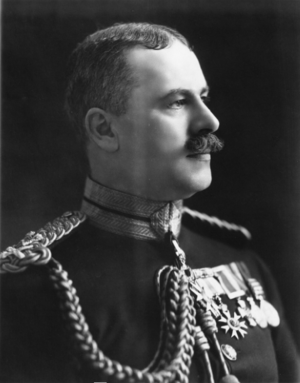Eugène Fiset facts for kids
Quick facts for kids
Sir Eugène Fiset
KCMG DSO ED
|
|
|---|---|
 |
|
| 18th Lieutenant Governor of Quebec | |
| In office December 30, 1939 – October 3, 1950 |
|
| Monarch | George VI |
| Governor General | The Lord Tweedsmuir The Earl of Athlone The Viscount Alexander of Tunis |
| Premier | Adélard Godbout Maurice Duplessis |
| Preceded by | Ésioff-Léon Patenaude |
| Succeeded by | Gaspard Fauteux |
| Member of the Canadian Parliament for Rimouski |
|
| In office September 2, 1924 – December 30, 1939 |
|
| Preceded by | Joseph-Émile-Stanislas-Émmanuel D'Anjou |
| Succeeded by | Joseph-Émile-Stanislas-Émmanuel D'Anjou |
| Personal details | |
| Born | March 15, 1874 Rimouski, Quebec, Canada |
| Died | June 8, 1951 (aged 77) Quebec |
| Nationality | Canadian citizenship |
| Political party | Liberal |
| Spouses | Zoé-Mary Stella Taschereau, daughter of Thomas Linière Taschereau |
| Relations | Jean-Baptiste Romuald Fiset, father |
| Alma mater | Laval University |
| Occupation | physician, military officer |
Sir Marie-Joseph-Eugène Fiset (born March 15, 1874 – died June 8, 1951) was an important Canadian figure. He was a doctor and a high-ranking military officer. He also served as a Member of Parliament. Later, he became the 18th Lieutenant Governor of Quebec. He was even Canada's third Surgeon General, a top medical role in the military.
Early Life and Education
Eugène Fiset was born in Rimouski, Quebec, on March 15, 1874. His father was Jean-Baptiste Romuald Fiset. Eugène went to Rimouski College for his early studies. He then attended Laval University. There, he earned a Bachelor of Arts degree. He also earned his M.D. degree, becoming a physician.
Military Career
Eugène Fiset started his military journey very young. At just 16, he joined the 89th Temiscouata and Rimouski Battalion of Infantry. He continued his military training while studying. He was promoted to lieutenant while still a student.
In 1899, he followed in his father's footsteps. He became the surgeon for the 89th Battalion. A few months later, he joined the Second (Special Service) Battalion. This was part of The Royal Canadian Regiment. He served as a major in the South African War. For his brave service, he received the Distinguished Service Order (DSO).
After his time in South Africa ended in 1900, Fiset continued his medical training. He interned at a hospital in London. He also studied at a hospital in Paris.
He returned to Rimouski for a year. Then, he became an adjutant in the Royal Canadian Army Medical Corps. In 1902, he was part of a special group. This group represented Canada at King Edward VII's coronation. He traveled to the United Kingdom for this event. In 1903, he was promoted to colonel. He then became the Director-General of the medical service.
At the start of World War I, Fiset was promoted again. He became a Surgeon General. This is a very high rank. For his service during the war, he was knighted. This means he received the title "Sir." The French government also honored him. They named him a Commandeur of the Legion of Honour.
Political Career
After a long military career, Fiset retired in 1923. He then started a new path in politics. He became a Member of Parliament (MP). He represented the Rimouski area. He was a member of the Liberal Party. He served as an MP from 1924 until 1939. During this time, he also worked as the Deputy Minister of Militia and Defence.
On December 30, 1939, Fiset took on a very important role. He became the Lieutenant-Governor of Quebec. This position represents the King or Queen in Quebec. During World War II, he showed his support for the war effort. On two occasions, he opened the legislative assembly wearing his major general's uniform. He remained in this office until October 1, 1950.
See also
 | William M. Jackson |
 | Juan E. Gilbert |
 | Neil deGrasse Tyson |

